|
Fellow daycare parents:
I know the looks you give and the feelings you feel. In a past life – I was that parent too. When my son was in Kindergarten, we received a letter about the room being a “peanut aware” classroom so we had to refrain from bringing anything peanut. I remember feeling angry/annoyed and thinking “So my kid needs to suffer because some other kid has a stupid allergy?” but I still followed the rules. Fast forward 9 years. A sweet bundle of joy arrived. At about 3 months of age, we started noticing hives developing randomly. Sometimes when we would lotion her after bath, sometimes after eating baby cereal. I also noticed she had what seemed a constant cold for about 3 months. All in all, it had no rhyme or reason really so I couldn’t pinpoint what was going on. One day (actually sitting at pizza barn eating supper) it clicked. SHE IS ALLERGIC TO DAIRY! So, I put a dab of cottage cheese “juice” on her cheek and sure enough - hives. When she was clinically diagnosed – I cried. As you know, there is no cure unless your body outgrows it. Then the learning curve happened at our house. For example, did you know that if you cut a piece of cheese, and then cut a banana with the same knife – my daughter will break out in hives if she eats the banana? Or if a child is drinking milk and bites my daughter shortly after, she will break out in hives? Or that a picnic table at a public facility has to be wiped down or she can break out in hives? How about her washing her hands in a sink where someone previously used it with “cheesy fingers?” The faucet is now contaminated and her hands break out in hives. Stupid right? But it’s not just hives, they HURT and they ITCH and then we have to Benadryl her which makes her sleepy and hallucinate. It’s not fair. We also discovered there is such a thing as “biphasic anaphylaxis.” That means that some kids have a second reaction (thus two epi pens) and if you have a history of it you’re more likely to have it in the future. Guess what my daughter has? You guessed it. Biphasic anaphylaxis. So 24 hours later her throat closes AGAIN from the first reaction. I remember still vividly in October, when my daughter was hospitalized. We still cannot pinpoint for sure but it was most likely a food reaction. She got so sick for days and she eventually gave up eating. No fluids would stay in her poor little body. We ended up at Children’s, and along with two bags of IV fluids – she also needed glucose. Her blood sugar levels were down to 47 – which is about where your brain shuts down because there is not enough glucose to function properly and you end up in a coma. Yep. From a food allergy folks. I would give ANYTHING for her to not have food allergies. She knows that certain things are “owies” and that she has to ask mommy before she can eat anything. She also knows to advocate for herself by telling other people and kids not to touch her with their cheesy fingers. But it’s flawed. She is 3. And she so desperately sometimes wants to eat “normal food” like mac and cheese and pizza and string cheese. So why am I telling you all of this? Because I need your help. Here’s what you need to know. Her allergist had informed us how severe allergic reactions are so much more than just your throat closing like we all imagine it to be, and I wanted fellow daycare parents to be informed. Symptoms include hives, swelling, coughing, vomiting, diarrhea, anaphylaxis, and rash. My daughter has had all of the above. The first time her throat closed, she drank out of a cup with cow’s milk. She started coughing (her throat was actually closing) then she looked pale and vomited so many times in such a short amount of time it was horrifying. Her hives in her mouth and her face closed her up and the wheezing started. That was by far the scariest moment of my life. What I have learned since is that the sooner you give epinephrine, the faster they recover from all symptoms and the longer you hold off, the more damage is caused to their little bodies so the faster you Epi them the better. I also wanted you to know that when letters are sent home from the daycare facility about bringing “safe treats,” it’s not because we want to make everyone’s life miserable. Seriously. I love chocolate too. It’s because it helps keeps my daughter safe. And when you to bring in treats that do not follow the regulations: now my daughter is home, I am missing work and income, because she is vomiting still, hours later. For the parents who listened – even if it was with a crabby attitude like myself years before.. THANK YOU. There are few places I can take my daughter. Knowing she is safe in her home and her daycare are about the only places I can try to control. My daughter’s life is literally in your hands. This is real stuff folks. Her allergy albeit unwanted is real and it can and WILL kill her if something happens. The saying “it takes a village” is more applicable than what one might think. My daughter NEEDS your help and cooperation in order to simply stay alive. Thank you for listening and understanding. ~Contributed by a Bright Child parent If you had asked me a few months ago what my mornings were like, I would have told you I dreaded them and that they were the worst part of my day. They included me most likely raising my voice at some point, tears from one if not both of the kids, us being late and almost always me feeling guilty on the drive in because of how the morning went. One morning in particular my youngest looked at me and said "You don't like me anymore"? It was that morning as I was driving in and crying that I decided that things needed to change. I started searching the internet, Pinterest and blogs trying to find a solution. I found so many great ideas and it was so hard choosing which ones I wanted to try and implement. 1. Bedtime I am "That Parent" my kids both have TV's in their rooms. They fell asleep to the television. It was so much easier when I was tired and wanted some down time. My kids never really had a set bedtime! I sat down and jotted down what I would like our evening to look like and came up with a time that would get me some down time at night and would not find them laying awake for an hour. I needed this to work so having them lay for a long period of time would result in them getting out of bed numerous times which in turn would frustrate me and then who knows. 8:00pm was the time I chose. They would get 30 minutes of book time. The book time allows their little bodies time to relax, setting us up for an easy lights out. Okay, maybe not easy but easier than if I just threw them into bed and shut the light off. I also do a lot and I mean A LOT of counting down so they know what is coming. We have transitioned to no TV bedtimes nicely. 2. Preparing The Night Before Much of our previous mornings consisted of my children wanting to pick out their clothes. My youngest wanting to get everything himself and my oldest wanting to choose her clothes herself. This usually meant that we would go through 10 outfits which none matched or there were for the wrong season (shorts in 30 degree weather). Currently we just pick out the night before but for those of you that are ambitious and want to prepare for the week, here is an idea from The Boy's Store Blog. In addition to choosing clothes the night before, we also pack backpacks and making sure that we have everything needed the next day. 3. Take Time For Yourself I don't know about you but when I get mommy time, I am in a much better mood. I decided to get up 15 to 30 minutes early. Personally, I make a cup of coffee and take some time to go through my devotion app. The one that I like is called Daily Devotional for Women. I love this app, it has daily prayers, quotes, bible verses and more! No matter what you choose to do in those few short minutes whether it be, a devotion, watching the news with a cup of coffee or working out - do it for yourself. 4. Make Waking Up Pleasant I don't know about you but I don't like waking up to buzzing alarms, a bright light popping on or someone yelling at me to wake up. I would love to be able to jump into bed and snuggle them awake but with loft beds it really isn't an option. I have been putting on music in the morning. My youngest still needs a 5 minute snuggle in the morning on the couch when he wakes up. I have built that into my morning. I just remind myself that someday he won't want mommy snuggles. 5. Let Them Know What Is Expected I have made a "Getting Ready" board. I got inspiration from The Crafting Chicks and created a board that worked for us with the things I needed completed in the mornings to get out the door. The love being able to move their magnets and get "done" first. Plus, I am able to get myself ready during this time as well instead of barking out orders. 6. Count Down
I am big on counting down. I give them a heads up when we have 10 minutes, 5 minutes and 3 minutes when we need to start getting our stuff on. Most of the time these days they are in the car waiting for me by the time I walk out to the garage. 7. Reward Them It doesn't need to be anything big but I give them an extra 15 minutes of screen time. It's not really extra because I have built it into the amount of screen time I actually want them to have.
-Written by Dear Mom Working for Bright Child Development Center As we finish up the first days of school and try to settle into our new routines there are still the anxieties that come with new places. By helping your child transition into their new schedule or environment you can help ease their worries.
Learning to separate is a lifelong process and an important part of growing up. When you help children learn to manage separations from and reunions with their loved ones, they feel understood and gain self-confidence. A child’s stage of development influences the way he or she reacts to hellos and good-byes. In part because they involve such strong feelings, hellos and good-byes are opportunities for valuable learning that affects all areas of young children’s development. During separation, children will learn about themselves and others, learn about their world, and learn to communicate as well as establish and sustain positive relationships with their peers, teachers and parents. Suggestions to Support Successful Good-byes:
Mobile Infants typically show more of a preference than young infants to be with family members and special adults. Around the age of 8-12 months children often develop anxiety about being separated from the special adults with whom they have bonded. While helping a child through difficult separations may be challenging for both you and the child, remember that the difficulty is a sign that the child has a secure, healthy attachment with their parents. Toddlers and twos may cheerfully wave good-bye to their families on some days. On other days, they may cling so tightly to their parents that you have to pull them off gently so that their parents can leave. If you have established a nurturing relationship with children and if they have a consistent routine, then, even on the most challenging days, children will know that they can trust you to ease them through difficult times. Please feel free to express your questions, concerns or feedback to myself or your child’s teachers. Warmest Regards, Michelle We want to foster positive relationships each child. Giving us the inside scoop on her likes, dislikes, and special needs helps us really connect with your child each and everyday.
|
AuthorVarious. Archives
December 2019
Categories |
About |
Curriculum |
|


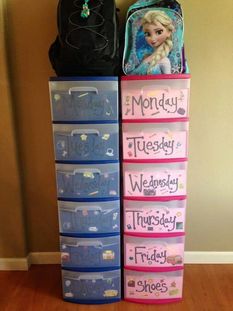



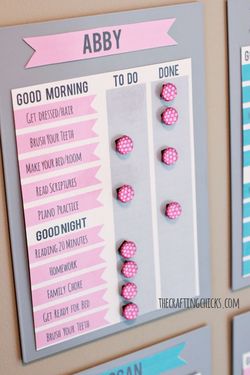
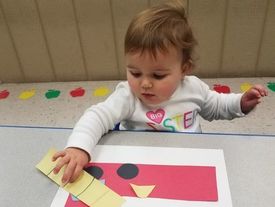
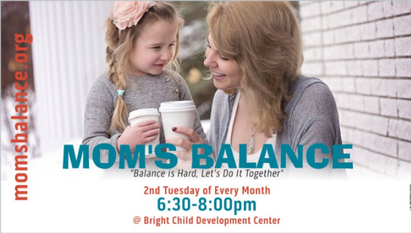

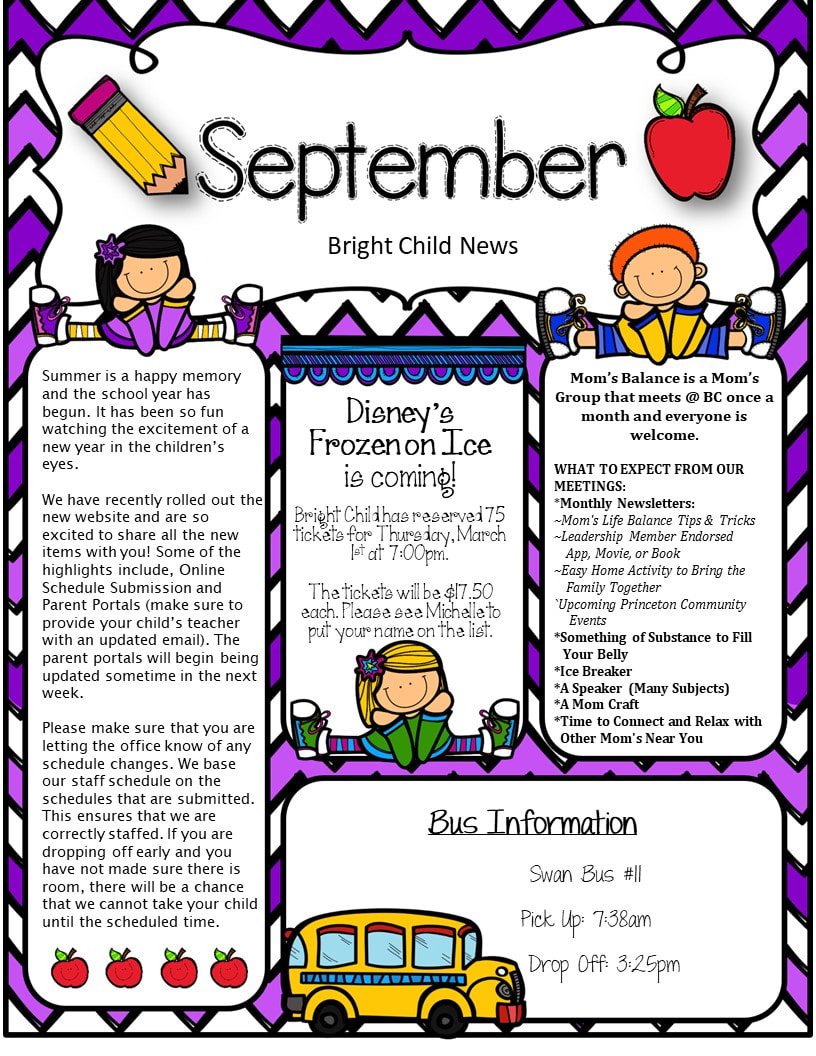

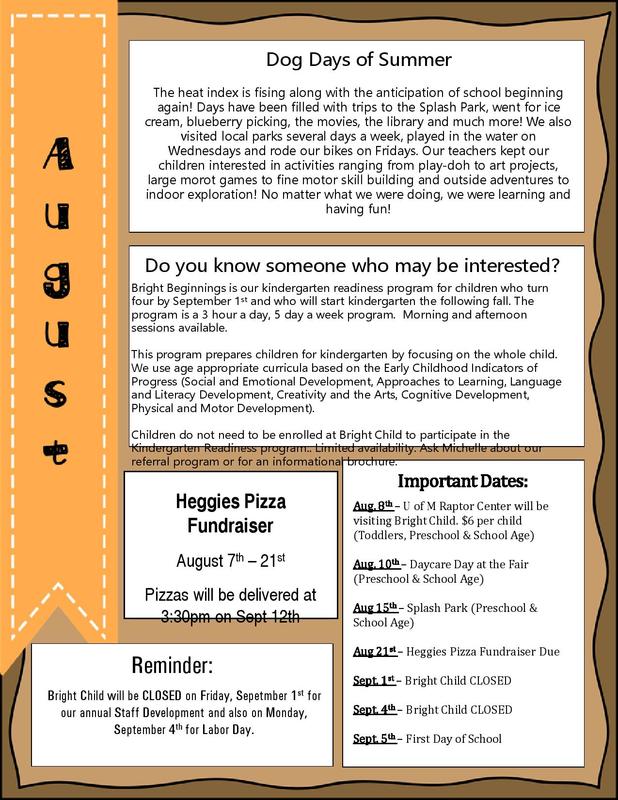
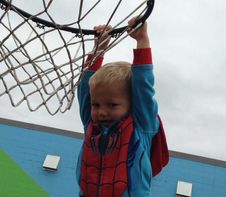
 RSS Feed
RSS Feed